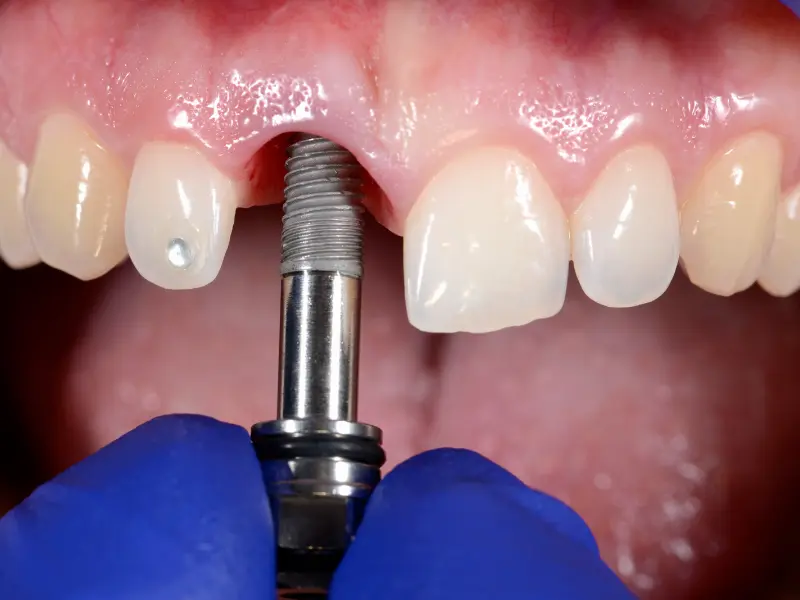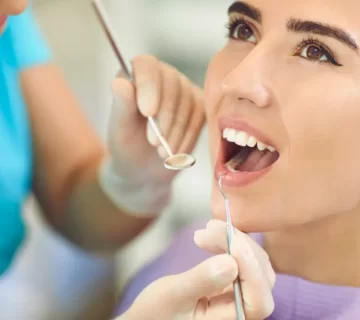If you have recently undergone a dental implant procedure, your dentist might have advised you to avoid dairy products for a certain period. You might be wondering why dairy products, which are a vital source of calcium, are not recommended after a dental implant. In this article, we will discuss the reasons behind this advice and what you should do instead to ensure proper healing of your implant.
Table of Contents
What is a dental implant?
A dental implant is a surgical procedure in which an artificial tooth root is implanted in the jawbone to provide support for a replacement tooth or bridge. The implant is made of titanium, a biocompatible material that fuses with the jawbone over time, creating a stable base for the replacement tooth.
The implantation process involves placing the implant in the jawbone, allowing it to heal and integrate with the bone tissue, and then attaching a replacement tooth to the implant. The healing process is critical to the success of the implant, and it requires proper care and maintenance.
Dairy products and dental implants: The connection
Your dentist might advise you to avoid dairy products, including milk, cheese, and yogurt, for a few days after your dental implant surgery. Here are some reasons why:
Lactose intolerance and inflammation
Many people are lactose intolerant, meaning their bodies cannot digest lactose, the primary sugar found in milk and other dairy products. This can cause bloating, gas, and diarrhea, which can put pressure on the implant site and slow down the healing process.
Moreover, some studies suggest that lactose intolerance may cause inflammation in the body, which can also interfere with the healing process. By avoiding dairy products, you can prevent lactose-related discomfort and promote proper healing.
High protein and mineral content
While dairy products are an excellent source of calcium, they also contain high levels of protein, which can be counterproductive to the healing process. Protein is essential for tissue repair and growth, but excessive protein intake can lead to inflammation and slow down the healing process.
Check This Out! Teeth Whitening Turkey How to Get a Brighter Smile in Turkey
Furthermore, dairy products may contain high levels of phosphorus, which can interfere with calcium absorption, another critical nutrient for bone growth and healing. Therefore, it is recommended to limit dairy intake after a dental implant and opt for calcium-rich alternatives instead.
Foods to eat after a dental implant and Why No Dairy After Dental Implant
After a dental implant, it is crucial to consume nutrient-dense foods that promote healing and support bone growth. Here are some options that you can include in your diet:

Calcium-rich alternatives to dairy
While dairy products are an excellent source of calcium, there are many non-dairy alternatives that you can consume after a dental implant. Some examples include:
- Dark leafy greens such as kale, spinach, and collard greens
- Almonds, chia seeds, and sesame seeds
- Canned fish with soft bones such as salmon and sardines
- Fortified plant-based milks such as soy, almond, or rice milk
Foods that promote healing
Apart from calcium, there are other nutrients that are essential for proper healing after a dental implant. These include:
- Vitamin C, found in citrus fruits, kiwi, strawberries, and tomatoes
- Zinc, found in pumpkin seeds, beef, chicken, and lentils
- Iron, found in red meat, spinach, and legumes
Consuming a balanced diet rich in these nutrients can help speed up the healing process and reduce the risk of complications.
Other post-implant care tips and Why No Dairy After Dental Implant
Apart from avoiding dairy products and consuming nutrient-dense foods, there are other post-implant care tips that you should follow to ensure proper healing of your implant. Here are some suggestions:
Proper oral hygiene
Maintaining good oral hygiene is essential after a dental implant. Brush your teeth twice a day, floss regularly, and use an antimicrobial mouthwash to prevent infection and promote healing.

Avoiding hard and crunchy foods
During the healing process, it is best to avoid hard and crunchy foods that can put pressure on the implant site and slow down the healing process. Stick to soft and easy-to-chew foods such as soups, smoothies, and mashed potatoes.
FAQs about Why No Dairy After Dental Implant
- Can I consume dairy products after the initial healing period?
- Yes, once the implant has fully healed and integrated with the jawbone, you can consume dairy products as part of a balanced diet.
- How long should I avoid dairy after a dental implant?
- Your dentist will advise you on how long to avoid dairy products based on your individual situation. Typically, it is recommended to avoid dairy for a few days after the surgery.
- What are some signs of implant failure?
- Signs of implant failure include persistent pain, swelling, infection, or mobility of the implant.
- Can I use a straw after a dental implant?
- Using a straw can create suction that can dislodge the blood clot and delay the healing process. Therefore, it is best to avoid using a straw for the first few days after the surgery.
- Is a dental implant a permanent solution?
- A dental implant is a long-lasting solution that can last for many years with proper care and maintenance. However, like natural teeth, implants can wear down or fail over time due to factors such as poor oral hygiene or trauma.

Conclusion of Why No Dairy After Dental Implant
In conclusion, avoiding dairy products after a dental implant is recommended to prevent lactose intolerance-related discomfort, reduce inflammation, and promote proper healing. Instead, consume nutrient-dense foods rich in calcium, vitamin C, zinc, and iron to speed up the healing process and support bone growth. Additionally, maintaining proper oral hygiene and avoiding hard and crunchy foods can also help ensure the success of your implant.





No comment